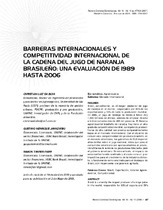Barreras internacionales y competitividad internacional de la cadena del jugo de naranja Brasileño: Una evaluación de 1989 hasta 2006
Documentos PDF
Resumen
Brasil actualmente es el mayor productor de jugo de naranja en el mundo, responsable por 83% de las exportaciones y 59% de toda producción mundial. En 2006 el jugo de naranja ha traído a Brasil US$ 1,043 billones en divisas, además de emplear directa e indirectamente más de 400 mil personas. El Sistema agroindustrial brasileño de naranja hoy tiene un alto grado de competitividad mundial consiguiendo producir frutos de alta calidad con precios comparativamente bajos en el mercado internacional. Con objetivo de reducir esta competitividad del producto brasileño en el mercado americano, los gobiernos de EUA imponem altas tarifas sobre el jugo nacional, estas que para el consumidor americano son apenas añadidas al precio, transfiriendo la renta de los productores brasileños para el gobierno americano. En este articulo el impacto de estas tarifas ha sido analizado y aforado como un gran impeditivo para el crecimiento de la industria citrícola, y funcionando como una traba para el destaque de Brasil aún mayor como una potencia agrícola. Brazil is currently the largest producer of orange juice in the world, responsible for 83% of exports and 59% of all global production. In 2006 the orange juice has brought to Brazil U.S. $ 1043 billion in foreign exchange, in addition to directly and indirectly employing over 400 thousand people. On agribusiness System Brazilian orange today has a high degree of achieving global competitiveness produce high quality fruits with comparatively low prices in the international market. With this goal of reducing competitiveness of Brazilian products into the American market, governments imponem U.S. high tariffs on national juice, such as for the American consumers are just added to the price, transferred producers' incomes Brazilians for the U.S. government. In this article the impact of these charges has been analyzed and aforado as a great impeditive for the growth of the citrus industry, and function as an obstacle to the highlight of Brazil as an even greater agricultural output.
ISSN
1794-8347
Palabra/s clave
Brasil
exportación
sistema agroindustrial
competitividad
Brazil
exports
Agroindustrial System
Competitiveness
Colecciones
El ítem tiene asociados los siguientes ficheros de licencia:


